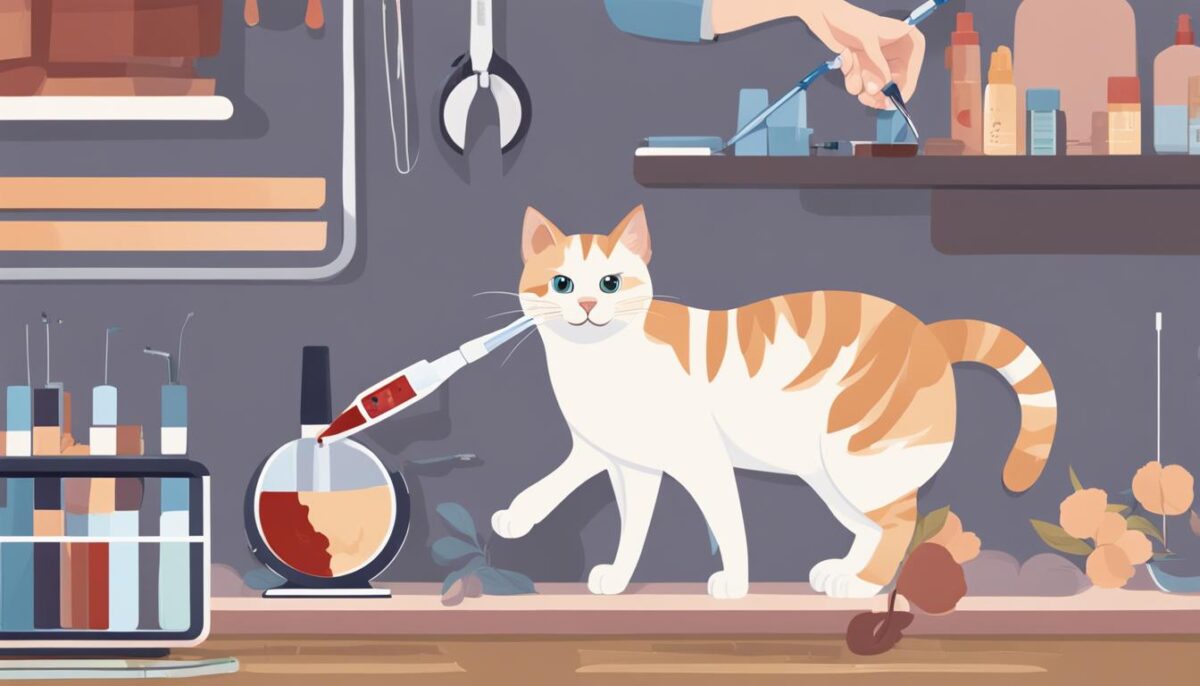Do you know that your furry friends can have allergies just like you? It’s true! Cats can get feline allergies, and these can make them feel pretty bad. When cats have allergies, their bodies get upset by things that don’t usually cause problems. They might feel itchy or have a hard time with sneezes and coughs. You might even notice their skin looks different or they don’t want to eat. Sometimes cats have allergic reactions that upset their stomachs too.
It’s important for you to know about cat health issues, especially allergies. If your cat isn’t feeling well, you might see them scratching a lot or not acting like their happy selves. By learning about what makes them itch or sneeze, you can help keep them away from those things and make sure they stay happy and healthy!
Key Takeaways
- Cats can have allergies just like people.
- Things that cause allergies in cats include some foods, fleas, and dust or pollen in the air.
- Allergies can make a cat’s skin bumpy, or they may sneeze, cough, or have a tummy ache.
- Watching your cat and learning about allergies can help them feel better.
- Helping your cat avoid allergic things is a big part of keeping them healthy.
Understanding Feline Allergies and Their Common Causes
Have you ever seen your furry friend scratch themselves more than usual? They could be showing symptoms of cat allergies. Cats, like humans, can react to things that make them feel not so good. This could be anything from smells in the air to something in their yum-yum bowl.
Identifying Signs of Allergies in Cats
When cats have allergies, they might scratch a lot or have an upset tummy. You might see them scratching their head or neck, or they could throw up or have diarrhea. These are clues that something is making them feel itchy or sick, and it’s important to notice these symptoms of cat allergies.
The Science Behind Why Cats Develop Allergies
So, what are these causes of allergies in cats? It’s all about their body trying to fight off things it thinks are bad, like certain foods or icky flea bites. Imagine if you ate something yucky by accident – your body wouldn’t like it, right? It’s the same for cats, and that’s when you might notice them itching or sneezing a bunch.
Common Allergens That Affect Cats
Ever wonder what cats are allergic to? Some kitties might be allergic all year, and it can be tough to figure out what’s bothering them. Keep an eye on your furry pal to see if they itch more at specific times or after eating something different. This can help you know what they’re allergic to and keep them from feeling itchy or sick.
Learning about cat allergies is the first step to helping your little friend feel their best. It’s all about paying attention to their little hints, like scratching or feeling sick, to make sure they can play and cuddle happily with you!
Types of Allergic Reactions in Cats
If your kitty friend is feeling itchy or sick, they might have allergies. Like us, our feline pals can have different cat allergies. Some cats’ skin might not feel good, and they start to scratch a lot. They get something called allergic dermatitis, which means they can’t stop itching. Other times, cats sneeze, cough, or their eyes water – those are feline allergic responses.
It’s not fun for them, and it’s not fun for us to watch. But if you know what kind of allergies they have, you can help them feel better! Let’s look at some types of allergies cats can get.
- Itchy skin or allergic dermatitis
- Sneezing and watery eyes
- Stomach troubles, like gas or diarrhea
Imagine not feeling great and not being able to tell anyone what’s wrong. That’s how it is for our cats. Knowing the types of allergies can make a big difference for them.
| Allergy Type | What You Might See | How to Help |
|---|---|---|
| Skin Allergies (Dermatitis) | Scratching, red spots, hair loss | Gentle shampoos, vet-prescribed creams |
| Respiratory Allergies | Sneezing, coughing, wheezing | Keeping air clean, vet care if severe |
| Stomach Allergies | Throwing up, diarrhea | Special food from the vet, lots of water |
If you think your cat has allergies, taking them to the vet is the best step. They can find out what’s bothering your fur baby and make them feel all better!
How Diet Influences Feline Allergies
Did you know what your cat eats can affect their allergies? Just like us, cats can have trouble with some foods. They might get itchy, lose hair, or have tummy problems. Let’s find out how to help them with this pesky problem.
The Link Between Food Ingredients and Cat Allergies
When you see your cat scratching or not feeling well after meals, they may be facing cat food allergies. Some common allergens in cat food include beef, dairy, and even fish. It’s smart to know what’s in your cat’s food bowl.
What to Do When You Suspect Your Cat Has a Food Allergy
If you think certain foods don’t agree with your cat, it’s time for a change. Talking to your vet is the best first step. They know all about these allergies and how to help your furry friend.
Implementing an Elimination Diet to Identify Allergens
What’s an elimination diet for cats? Well, it’s like a food mystery game. You give your cat some new foods, like venison or kangaroo meat, and see if things get better. No more scratching? A-ha! You might have solved the allergy puzzle!
Here’s a table to help you understand how this diet might look:
| Week | Primary Protein | Carb Source | Note |
|---|---|---|---|
| 1-2 | Venison | Potato | Start simple |
| 3-4 | Kangaroo | Peas | Watch for changes |
| 5-6 | Duck | Sweet Potato | Check for scratching |
This table shows just one way to switch up a cat’s menu. It’s all about being a food detective to help your cat feel great!
Can Cats Get Allergies Resulting from Environmental Factors?
Just like you might sneeze in the spring, cats can get itchy from things inside and outside the house. Stuff that makes people sneeze, like dust and pollen, can also make cats have allergies. This can bother your cat a lot. They might scratch their skin, shake their heads, or even lose some fur.
Indoor vs. Outdoor Allergens: What’s Worse for Your Cat?
There are two types of sneezy stuff that can bother cats – indoor and outdoor. Indoor things like dust from your home and little dust mites can make your cat feel itchy. Outdoor stuff like pollen from trees and grass can also make them scratch. Your vet can help figure out which kind makes your cat feel worse.
Atopic Dermatitis in Cats: A Closer Look
When your cat gets really itchy from things in the air, like dust or pollen, they might have something called atopic dermatitis. This means their skin is super sensitive to these tiny things you can’t even see. Their ears might get all itchy, they can lose fur, or they could get little bumps on their skin that bother them a lot.
| Indoor Allergens | Outdoor Allergens |
|---|---|
| Dust mites | Pollen |
| House dust | Molds |
| Perfumes | Ragweed |
The Role of Fleas in Cat Allergies
Imagine tiny bugs that can make your cat super itchy. That’s right, we’re talking about flea allergy dermatitis! It’s a big word, but it simply means your cat is really bothered by flea bites. Just one little bite from these fleas on cats can make your cat scratch like crazy because they are allergic to what’s inside the flea’s bite.
To stop these itchy allergies, you have to keep those sneaky fleas away. Using special flea-fighting products can help. These products make it not so nice for fleas to stick around on your cat’s furry coat or in your home. When you use these products and your cat’s scratchy skin gets all better, it’s a good hint that they were allergic to those pesky fleas. Keeping your cat flea-free is a big part of treating flea allergies.
Remember, fleas are no fun for your cat, and they can cause more trouble than just itchiness. So, keeping your home and your furry friend flea-free is super important. Your cat will thank you with lots of happy purrs and snuggles!
Diagnosing and Treating Cat Allergies
If your furry friend is itchy or sneezy, you might wonder if they have allergies. Let’s learn about how vets figure out what’s bugging your cat and ways to help them feel better.
When to Bring Your Cat to the Vet for Allergy Symptoms
You know your cat best. If they start to scratch a lot or they sneeze more than normal, it might be time to visit the vet. Vets are like detectives for your cat’s health. They’re really good at finding out what’s wrong and helping your cat be happy again.
Available Tests for Allergies in Cats
When you’re with the vet, they might want to run special tests to see what’s causing the allergy. This can include looking at your cat’s blood or even their skin. It’s like a puzzle, and these clues help solve the mystery of your cat’s itch.
Different Treatment Options for Allergic Cats
There are many ways to help your itchy kitty. Here are a few things the vet might suggest:
- Special diets are like secret recipes that avoid the stuff your cat’s allergic to.
- Medicine that can help stop the itching and make your cat comfy.
- Shots that can teach your cat’s body not to overreact to allergens.
Remember, the vet’s advice is important. They want your cat to feel great, just like you do.
| Allergy Test | What It Does | How It Helps |
|---|---|---|
| Blood Test | Checks your cat’s blood for signs of allergies. | Finds what your cat might be allergic to. |
| Skin Test | Looks at how your cat’s skin reacts to different things. | Shows what things make your cat itch. |
Managing Allergies for Better Feline Life Quality
If your cat’s sneezing, itching, or having a hard time with allergies, you want them to feel better. Luckily, there are ways of managing cat allergies that help your furry buddy enjoy life more. Giving them special care with natural stuff and working with your vet can make a big change.
Natural Remedies and Supplements for Allergic Cats
Some natural things can help cats feel less itchy. For example, oils from fish are great because they have stuff in them that may make your cat’s skin feel better. This is part of feline natural therapies that many pet parents like to try.
- Omega-3 fatty acids (like those in fish oil) can help reduce skin inflammation.
- Probiotics can support a healthy gut, which might help with some allergies.
Integrative Approaches: Combining Traditional and Alternative Therapies
It can be good to use different kinds of treatments together. This is called integrative treatment for allergies. Your vet might give your cat some medicine to stop the itch right away. Then, they might add some natural things to support your cat’s health overall.
| Treatment Type | Purpose | Benefits |
|---|---|---|
| Traditional Medication | Quick relief of allergy symptoms | Fast-acting, vet-recommended |
| Natural Supplements | Long-term support of skin and gut health | May improve overall well-being |
The best thing is to keep watching your cat and talking to the vet about how they’re doing. When cats get the right treatment, they can play and cuddle just like they always do, without all that scratching and sneezing.
Conclusion
Just like you, your four-legged friend can feel bad from allergies. You’ve seen how cats might scratch a lot, sneeze, or even have an upset tummy. It’s your job to help your furry buddy by noticing these signs and to talk to your vet. They’re super good at helping your cat feel better. Your vet can show you the best cat allergy solutions and give tips for supporting cats with allergies.
There are lots of ways to help cats not feel itchy or sick from allergies. With the right food and maybe some flea-fighting stuff, your pet pal can live a fun and allergy-free life for cats. Remember to keep your kitty away from things that make them itch and give them lots of love. This is the way to keep them purring and happy. So, take good care of your cat, and they can have many playful days ahead.
FAQ
Can cats experience allergic reactions similarly to humans?
Yes, cats can get allergies just like people, reacting to things like foods, flea bites, or environmental elements with symptoms such as itching and digestive upset.
What are the signs that my cat may have an allergy?
Your cat might show signs of allergies by scratching excessively, especially around their head and neck, or by having respiratory or gastrointestinal issues like sneezing, coughing, vomiting, or diarrhea.
Why do cats develop allergies?
Cats develop allergies when their immune system is overly sensitive to certain substances, treating them as harmful even though they’re usually not dangerous. The body’s defense mechanism response causes allergy symptoms.
What are common allergens that can affect cats?
Common allergens for cats include certain foods, flea saliva (flea allergy dermatitis), and environmental triggers such as dust, pollen, or mold.
How can diet influence my cat’s allergies?
Diet can play a big role in feline allergies. Ingredients in certain cat foods can trigger allergic reactions, leading to symptoms like itchy skin or digestive issues.
What should I do if I think my cat has a food allergy?
If you suspect your cat has a food allergy, you should consult your vet. They may recommend an elimination diet to determine what ingredients are causing the reaction.
How can I identify if my cat has allergies from environmental factors?
Indoor allergens like dust or household chemicals, as well as outdoor allergens like pollen and mold, can cause symptoms such as skin itchiness and respiratory discomfort.
What role do fleas play in cat allergies?
Fleas can cause flea allergy dermatitis in sensitive cats, where a single flea bite can lead to severe itching and skin irritation due to an allergic reaction to flea saliva.
When is it necessary to take my cat to the vet for allergy symptoms?
If your cat is showing persistent or severe symptoms of allergies, such as excessive scratching, skin lesions, or recurring digestive issues, it’s important to visit the vet for proper diagnosis and treatment.
What kinds of tests can be done to diagnose allergies in cats?
Vets can perform various tests such as blood tests or skin tests to identify specific allergies in your cat.
What are the different treatment options for cats with allergies?
Treatment options for allergic cats can include special diets, medications to relieve itching, immunotherapy, and preventive measures for environmental or flea-related allergies.
Are there any natural remedies or supplements for allergic cats?
Yes, some natural remedies, like omega-3 fatty acid supplements from fish oil, can help reduce inflammation and skin itchiness.
Can traditional and alternative therapies be combined to manage cat allergies?
Integrative approaches to managing cat allergies often combine traditional treatments with alternative therapies for a more comprehensive approach to relieving symptoms and improving quality of life.


